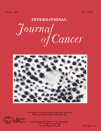Tumor suppressor gene Runx3 sensitizes gastric cancer cells to chemotherapeutic drugs by downregulating Bcl-2, MDR-1 and MRP-1
Abstract
The Runx3 gene is a member of the runt domain family transcription factors, key regulators of development and differentiation in metazoan. Recently, Runx3 was identified as a tumor suppressor gene. Loss of Runx3 was found to be associated with genesis and progression of gastric cancer. In this study, we transfected the gastric cancer cell line SGC7901 with eukaryotic expression vector of Runx3. In vitro drug sensitivity assay suggested that SGC7901/Runx3 cells were more sensitive to various chemotherapeutic drugs. Blocking Runx3 expression in immortalized stomach mucosal cells (GES-1) or gastric cancer cells (SGC7901) by Runx3-specific small interfering RNA conferred the cells resistance to chemotherapeutic drugs. Flow cytometry examination suggested that expression of Runx3 in gastric cancer cells increased the intracellular accumulation and retention of adriamycin. Semiquantitative RT-PCR and Western blot suggested that Runx3 downregulated expression of Bcl-2, MDR-1 (P-gp) and MRP-1. Binding of Runx3 to promoter sequences of Bcl-2, MDR-1 and MRP-1 gene was detected by eletrophoretic mobility shift assay (EMSA) and supershift EMSA. We cloned the MDR-1 and MRP-1 gene promoters containing Runx binding sites and constructed the luciferase reporter vectors of these 2 promoters. Luciferase reporter assay suggested that Runx3 inhibited the promoter activity of the MDR-1 and MRP-1 promoter in SGC7901 cells. Taken together, our findings suggested that overexpression of Runx3 could sensitize gastric cancer cells to chemotherapeutic drugs by downregulating the Bcl-2, MDR-1 and MRP-1. © 2005 Wiley-Liss, Inc.




